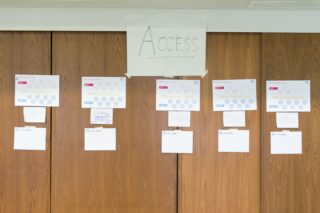As many of you may know, since April the Q Improvement Lab has been working on the challenge ‘what would it take for peer support to be available to everyone that wants it, to help manage their long-term health and wellbeing needs?’.
After an initial ‘research and discovery phase’ to understand the challenge and build on what is already known about peer support, we ran a 2-day workshop in July to explore the potential opportunities for the Lab to focus on.
One of the areas explored was ‘access’: what challenges do people face in trying to access peer support? How can we make access easier and make more people aware of the potential benefits of peer support?
This felt like an area that the Q Lab could make some progress on.

So as part of the Lab’s ‘developing and testing ideas’ phase (running September – January), one of three ‘briefs’ that the lab is focusing on is: How can we improve the routine offering and promotion of peer support in a primary care setting?
Initially we thought we might work with a number of GP practices to take this work forward but this didn’t allow us to work at scale, across the whole of the UK, in the time available.
We realised that little research had been done to understand what matters to people when deciding to refer or recommend peer support, and what matters to people when deciding to accessing peer support.
We came across a fantastic researcher in UCL who had trialled a new survey approach in the United States and was keen to work with us to help us explore this question, and Lab participants were willing and able to help co-design the survey.
We will be launching the survey in mid-December and working with a number of stakeholders to think about how the insight that is generated could be used to influence the conversations that are happening about peer support.
Peer support access survey
The survey will:
- enable us to see what factors are important when specific groups of people make decisions on referring to, recommending and/or accessing peer support
- generate new insights into the priorities of different stakeholders; highlighting convergence or divergence of opinions
- help the peer support community understand how messages, information and support could be tailored to help improve the overall uptake of peer support services
- support work to implement shared decision-making, offering new insights that could be used to explore local issues
It has been co-designed with Lab participants, colleagues at the Health Foundation, Q members as well as other stakeholders. We hope that by working with YouGov and through the Q community that significant numbers of people will complete the survey.
We think that this piece of work is really exciting: this kind of research at this scale has not, to our knowledge, been done before. If the data and insights are used across the UK it could provide a real opportunity to support the wider offering and uptake of peer support.
Next steps
Final survey testing will take place at the Lab’s next workshop on 5 December, and the survey will go live just before Christmas.
We are working with YouGov to help us reach some of the respondents but will need the help of Q members and Lab participants to fill in the survey and help us spread the word to get as many respondents as possible. We hope you will be part of this exciting piece of work and share with your networks.
If you’d like to be involved in shaping the outputs of the survey and sharing these throughout the health care community, get in touch – we’d love to hear from you QLab@health.org.uk